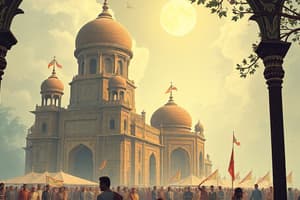Podcast
Questions and Answers
What impact has nationalism had on India?
What impact has nationalism had on India?
- Promoting division among the diverse population
- Negatively affecting India's political and social development
- Encouraging foreign dominance over India
- Fostering a sense of unity and pride in Indian culture (correct)
Which movement advocated for nonviolent resistance and civil disobedience in India?
Which movement advocated for nonviolent resistance and civil disobedience in India?
- Indian National Army
- Quit India movement
- Indian National Congress (correct)
- Revolutionary movements driven by aggression
What was the role of Mahatma Gandhi in India's nationalist movement?
What was the role of Mahatma Gandhi in India's nationalist movement?
- Inspiring millions with nonviolent resistance and civil disobedience (correct)
- Advocating for foreign dominance over India
- Using aggressive tactics to achieve independence
- Promoting divisive policies among Indians
How did revolutionary movements in India seek to achieve their goals?
How did revolutionary movements in India seek to achieve their goals?
What was the result of the partition of India in 1947?
What was the result of the partition of India in 1947?
What was the driving force behind the Indian independence movement?
What was the driving force behind the Indian independence movement?
What has continued to shape India's political landscape since the partition?
What has continued to shape India's political landscape since the partition?
What role did nationalism play in the Indian independence movement?
What role did nationalism play in the Indian independence movement?
What were the longstanding tensions that led to the partition of India?
What were the longstanding tensions that led to the partition of India?
How did the partition of India impact the people living in the region?
How did the partition of India impact the people living in the region?
Flashcards are hidden until you start studying
Study Notes
Nationalism in India
Nationalism is an idea that has played a significant role in shaping India's history and politics. It has been instrumental in various aspects of the country, including its impact, revolutionary movements, the role of Mahatma Gandhi, the partition of India, and the Indian independence movement.
Impact of Nationalism
Nationalism has had a profound impact on India, influencing its political and social development. It has helped to foster a sense of unity among the diverse population, promoting a sense of pride in Indian culture and history. Nationalism has also played a crucial role in shaping India's foreign policy, as it seeks to assert its position on the global stage.
Revolutionary Movements
Several revolutionary movements have emerged in India, driven by the desire for independence and the desire to assert national pride. The Indian National Congress was one of the earliest and most prominent of these movements, advocating for nonviolent resistance and civil disobedience. Other revolutionary movements, such as the Indian National Army and the Quit India movement, sought to use more aggressive tactics to achieve their goals.
Role of Mahatma Gandhi
Mahatma Gandhi, a key figure in India's nationalist movement, played a pivotal role in shaping the country's destiny. His philosophy of nonviolent resistance and civil disobedience inspired millions of Indians and helped to bring about the end of British rule. Gandhi's leadership and vision were instrumental in shaping the Indian independence movement and establishing a new era of political and social freedom in the country.
Partition of India
The partition of India, which occurred in 1947, was a tragic and traumatic event in the country's history. It was the result of longstanding tensions between Hindus and Muslims, which were fueled by nationalist sentiment. The partition led to widespread violence and displacement, with millions of people forced to flee their homes and communities. The lasting impacts of the partition can still be felt in India today, with ongoing tensions between Hindus and Muslims continuing to shape the country's political landscape.
Indian Independence Movement
The Indian independence movement was a long and arduous struggle, marked by numerous ups and downs. It was a diverse and complex process, involving a wide range of people and organizations. The movement was driven by a desire for self-determination, as well as a sense of national pride and a commitment to the values of democracy and freedom. In the end, the movement succeeded in achieving its goal, with India gaining independence from British rule in 1947.
In conclusion, nationalism has played a significant role in shaping India's history and politics. It has influenced the country's development in various ways, from driving revolutionary movements to shaping the Indian independence movement. Despite the challenges and difficulties, nationalism has been a powerful force for change and unity in India, helping to shape the country's destiny and chart its path towards a brighter future.
Studying That Suits You
Use AI to generate personalized quizzes and flashcards to suit your learning preferences.



